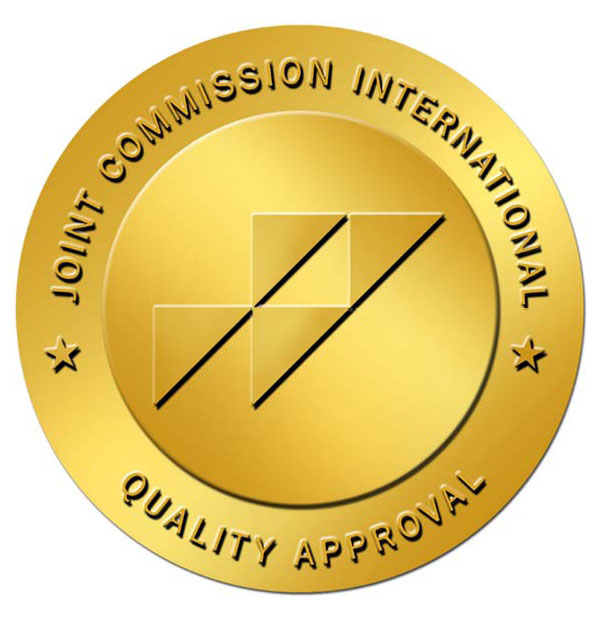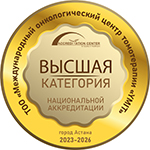Fibrocolonoscopy (FCS)
Colonoscopy (fibrocolonoscopy, FCS) is a modern instrumental method for examining the intestinal mucosa, allowing detecting the presence of a number of diseases with a high accuracy. This is the most accurate examination method, which has no analogues in terms of diagnostics and treatment. A special optical device – colonoscope is used for the examination. Its structural parts are a probe, illumination elements, air supply tubes, an eyepiece for transmitting video data, forceps for biopsy (sampling) and removal of foreign bodies, snares for polypectomy (excision of polyps). All modern devices are equipped with video cameras for taking pictures and transferring the image to the monitor screen installed in the procedure room or operating room.
Colonoscopy at the “Umit” Center is the use of all the unique possibilities of the procedure, during which a specialist examines the mucous membrane, assesses its tone and ability to contract, excludes or confirms the presence of a tumor, takes tissue samples for biopsy (examination), removes polyps (up to 1 mm), small benign neoplasms, extracts a foreign body, stops bleeding.
Performing examination “asleep”
We offer our patients “asleep” examinations. A patient falls into a short drug-induced sleep and does not feel any discomfort during the procedure and after it. Sedation is not anesthesia, it is easily tolerated by a patient and has practically no contraindications, the procedure is controlled by an anesthesiologist.
Goal of colonoscopy
Colonoscopy at the "Umit" Center allows identifying a number of diseases at early stages to exclude the development of serious complications.
The study allows the most accurate and timely diagnosis of almost all the most dangerous pathologies of the colon:
- inflammation (colitis, Crohn's disease)
- ulcers and erosion
- polyps and tumors
- intestinal bleeding, etc.
- When performing an endoscopic examination, the specialists of the center can take tissue samples for a biopsy.
Colonoscopy provides a unique opportunity to treat a number of pathologies without abdominal surgery.
Indications for colonoscopy
In addition to previously diagnosed cases of colon cancer and other serious pathologies, indications for a mandatory colonoscopy are as follows:
- suspicion of bowel disease (blood and mucus in feces, recurrent constipation or diarrhea, bloating and pain in the intestines)
- detection of feces occult blood
- increase in specific oncomarkers in blood tests
- anemia (low hemoglobin)
- sensation of a foreign body in the rectum
- low-grade fever (body temperature rise over a long period) of unclear etiology
- weight loss
- the need to monitor the treatment progress
- diagnosing of tumors, polyps and other neoplasms in the colon in relatives
- aged 45 and older (for the prevention of bowel cancer).
Colonoscopy “asleep”
Experienced doctors of the highest qualification work in the “Umit” Center. The doctors carefully monitor patient's reaction, choosing the pace of probe insertion, helping its passage by the abdominal palpation, etc. As a result, the insertion of a thin probe is performed with minimal discomfort. As for the possible painful sensations, they directly depend on the intestine state.
Often, emotional stress is more uncomfortable than the examination itself. If you are afraid that you will have discomfort, all problems can be solved by colonoscopy "asleep".
Colonoscopy "asleep" means that a patient falls into a drug-induced sleep. In our clinic, the newest drugs are used for this purpose. All of them guarantee the absence of discomfort and easy recovery. The examination is carried out under the supervision of an anesthesiologist, who performs an individual selection of the drug and its intravenous administration.
This is how all types of endoscopic examinations and manipulations are carried out in Europe, because when patient is calm and does not interfere with the examination, the doctor performs the entire necessary diagnostic complex as quickly, accurately and efficiently as possible. Our doctors have undergone additional training and qualification upgrade, the procedure is performed according to the world standards.
Duration of examination 20-30 minutes
Preparation of doctor’s conclusion 10-20 minutes
Results of the procedure: images and doctor’s detailed conclusion with a description of the large intestine condition
Memo to the patient






 public offer
public offer










